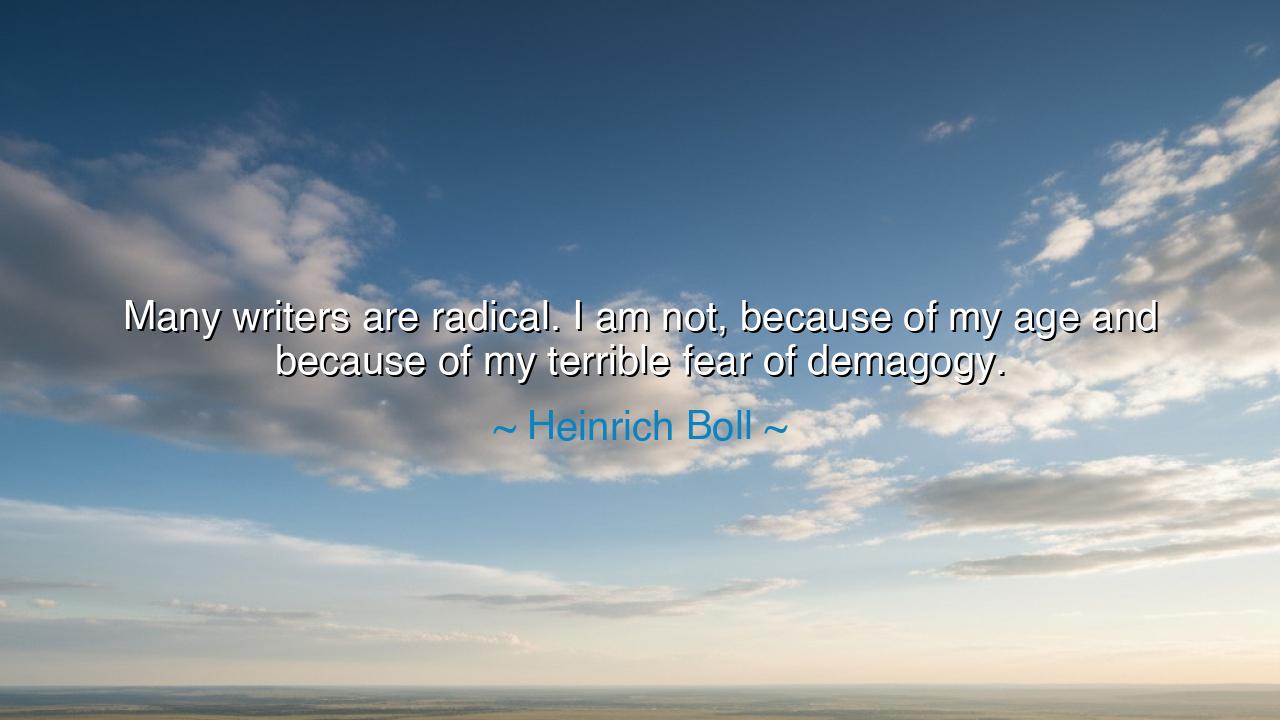
Many writers are radical. I am not, because of my age and because
Many writers are radical. I am not, because of my age and because of my terrible fear of demagogy.






In the twilight of postwar Europe, when words were as dangerous as weapons and truth itself seemed to walk in rags, the German novelist Heinrich Böll spoke with the tempered wisdom of one who had seen too much fire: “Many writers are radical. I am not, because of my age and because of my terrible fear of demagogy.” These are not the words of cowardice, but of clarity. They reveal a man who understood that the pen, while powerful, must be wielded with humility and caution. For Böll, who had lived through tyranny and ruin, the fear of demagogy—of words turned into weapons to enslave minds—was the fear of seeing history’s horrors return, dressed again in the seductive garments of rhetoric.
Böll had walked through the wreckage of Germany’s soul after the Second World War. He had witnessed how language, once a vessel of beauty and thought, had been twisted by propaganda into a tool of deception. He had seen how demagogues, with voices like thunder and hearts like stone, could rouse a nation to madness through the dark art of persuasion. Thus, when he spoke of fearing demagogy, he spoke not from theory, but from memory. His words carry the solemn authority of one who knows that passion without conscience can destroy as swiftly as it can inspire.
To say that “many writers are radical” is not an accusation, but an observation. Writers, by their nature, are drawn to rebellion—to tear down what is false and to cry out against injustice. Yet Böll’s wisdom lies in restraint. His age, he tells us, had taught him that extremity of any kind—whether born of anger or of idealism—can become its own tyranny. He had learned that revolution without reflection may replace one oppression with another. Thus, he chose not the fire of radicalism, but the steady flame of moral integrity. His was the courage of patience, the strength of one who refuses to be swept away by the fury of the age.
We can find the echo of this truth in the story of George Orwell, who, like Böll, witnessed the rise of totalitarianism and devoted his art to resisting it. Orwell understood that the line between justice and propaganda is perilously thin. His novels, Animal Farm and 1984, warned that when language is corrupted, freedom dies. Yet Orwell, too, feared becoming the thing he opposed. He wielded his pen not as a sword for a party or movement, but as a mirror to conscience. In both Orwell and Böll, we see the same sacred discipline: the refusal to let moral conviction harden into fanaticism.
The fear of demagogy that Böll confesses is not weakness—it is wisdom born of witnessing how easily people surrender reason for belonging. The demagogue thrives where emotion overpowers thought, where slogans replace truth. A writer, Böll knew, has the power to stir hearts, but also the duty to guard minds. His fear, therefore, is a form of reverence: reverence for truth, for freedom, for the delicate balance between inspiration and manipulation. To write responsibly, he believed, is to resist the intoxication of influence—to speak with power, but without domination.
There is, too, a profound humility in his admission of age. Age, for Böll, is not merely the passing of time, but the gaining of perspective. The young may see only the injustice that must be destroyed; the old have learned to see the fragility of what must be preserved. He does not condemn youthful radicalism; he merely stands apart from it, knowing that even noble anger must one day yield to the discipline of compassion. For true change endures not through rage, but through understanding.
From Böll’s words, we may draw a lesson for our own tumultuous age. In a world once again inflamed by noise and opinion, let us remember that the loudest voices are not always the truest, and that the call to righteousness can become its own form of blindness. The wise soul, whether writer or reader, must learn to listen as deeply as they speak—to question not only others, but themselves. To fear demagogy is not to retreat from truth, but to protect it from distortion.
Thus, the teaching endures: speak, but with conscience; write, but with humility; lead, but with mercy. Let your words be fire that warms, not burns; light that reveals, not blinds. For in an age of easy passion and hardening hearts, the true revolutionary is not the one who shouts the loudest, but the one who dares to speak truth with gentleness and restraint. As Böll reminds us, the greatest power a writer holds is not to inflame the world, but to help it think—and, in thinking, to heal.






AAdministratorAdministrator
Welcome, honored guests. Please leave a comment, we will respond soon